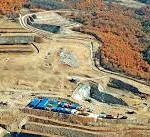 Zijin Mining, China’s largest gold miner and one of the country’s leading copper producers, has started operations at its Cukaru Peki copper and gold mine in Serbia.
Zijin Mining, China’s largest gold miner and one of the country’s leading copper producers, has started operations at its Cukaru Peki copper and gold mine in Serbia.
The resource, part of the Timok project, is expected to make the Balkan country the second largest copper producer in Europe. Zijin has poured $474 million to date into the new underground mine and reported that the upper zone is designed to process 3.3 million tonnes of ore per year.
The first part of the project involves the mining of an ultra-high grade ore body. It is expected to produce 50,000 tonnes of copper.
Cukaru Peki was originally scheduled to begin production in the summer of 2021, with an initial average copper production of 91,000 tonnes per year and an annual gold production of about 200,000 ounces. It is now expected to gradually increase production to a peak of 135,000 tonnes of copper per year.
Serbia’s government expects the country’s booming mining sector to start generating between 4% and 5% of its total GDP in less than 10 years, a significant increase from its current 2%.
In 2018, Zijin Mining became Serbia’s strategic partner in RTB Bor, the country’s only copper complex, pledging to invest $1.9bn over six years in exchange for a 63% stake.
Since then, it has invested $142m to improve ecology and the local environment, which is more than double the amount agreed in a strategic agreement with the company, according to Zijin.
The Zijin-RTB Boor venture has developed as Serbia has deepened its ties with China, despite concerns about the European Union, which the Balkan state is seeking to join.
RTB Bor, in eastern Serbia, was key to the development of Serbia’s industrial sector before the collapse of communist Yugoslavia in the early 1990s. However, it later became a burden on the country’s struggling economy due to malpractice and international sanctions during the regime of President Slobodan Milosevic.
The company had to temporarily stop work at the mine in April due to an alleged violation of the country’s environmental regulations.
The Serbian unit was ordered to complete a wastewater treatment plant at the mine as a matter of priority to avoid polluting the River Pek, a tributary of the Danube.
.gif) Loading
Loading

